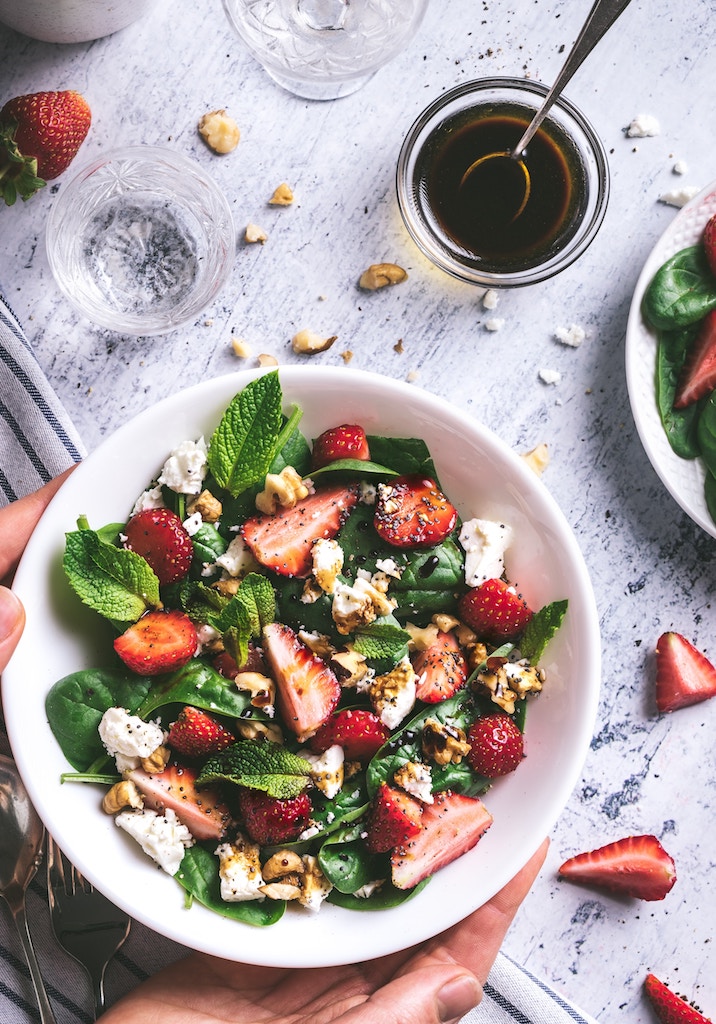Gut health has been a hot topic for some time now and rightfully so! After all, our gut microbiota and overall environment can have a knock on effect on other areas of health. This means even if you don’t have ‘gut symptoms’ you can still benefit from being more aware of how you can look after your gut and therefore overall health.
The foods we eat have a direct impact on not only our gut function but also the balance of bacteria we house and the metabolites they produce – which can be beneficial or detrimental.
There is no silver bullet when it comes to taking care of gut health, instead taking small steps every day to eat a healthy balanced diet full of gut friendly foods is key and here are 5 diet tweaks you can start making today to promote gut health.
Add a handful of walnuts to your afternoon snack
According to new research, eating around 60-100g raw walnuts daily, as part of a healthy diet, is associated with increases in certain bacteria that can help promote heart health. Specifically, the most benefit is gained when walnuts are added and saturated fats are decreased. Essentially, walnuts supply the gut microbes with a wide variety of substrates to feed off including healthy fats, fibre and polyphenols, which are then turned into beneficial metabolites which have positive effects in the body. The extra benefit of adding a handful of walnuts to your afternoon snack is that the protein, fibre and healthy fats will help to increase satiety and keep you feeling fuller for longer, reducing the desire to snack late into the afternoon and night – a difficult time period for some!
Order a seasonable veggie and fruit box from a local supplier
The reason I like this idea is not only because it supports local suppliers but because it forces you to change the plants you are eating on a regular basis. We now know that diet diversity is key to supporting gut health and we should be aiming for up to 30 different plant foods per week. This can be a struggle for some, especially those who like to eat the same foods day in and day out. By ordering a box, you take some of the control away and I am sure will be pleasantly surprised by how much you like trying new plants.
Flavour with spices
Instead of reaching for packet sauces and seasoning, I encourage you to make your own spice mixes from scratch. This does not have to be as labour intense as it sounds! Purchase a mix of ground spices or in seed/root form such as cumin, coriander, paprika, turmeric, ginger, sumac, chilli and mix with some extra virgin olive oil, fresh garlic, salt and pepper to create your very own flavour combination. Spices are rich in polyphenols – a class of chemical compounds found within plants, which exert antioxidant activities in the body. Polyphenols can help to neutralise free radicals from oxidative stress and inflammation. Including sources of polyphenols in the diet can benefit gut health because they act like prebiotics, helping to stimulate the growth of beneficial bacteria and inhibit the growth of pathogenic bacteria.
Swap meat for legumes at least one meal per week
If you eat animal protein every night for dinner without fail, try replacing meat for legumes at least one night per week or more frequently if you can. Legumes are not only a fantastic source of protein but also contain polyphenols and are low in saturated fat. Fibre helps to keep us regular and also helps to feed our good gut bacteria, which are needed to create a healthy gut. If you aren’t used to eating legumes, start slow because the high fibre content can lead to bloating or discomfort.
To give you an idea, the approximate fibre content of common legumes are listed below:
1 cup chickpeas = 9g fibre
1 cup lentils = 10g fibre
1 cup mixed beans = 12g fibre
1 cup red kidney beans = 13g fibre
1 cup cannellini beans = 16g fibre
Go green!
While plants as a whole are incredibly beneficial fuel for gut bacteria, leafy greens such as spinach, rocket and kale are particularly beneficial for providing energy to good bacteria, allowing them to flourish. An easy way to add more greens to your diet, is to simply, add a handful to each meal. For example, if you have a morning smoothie, add a handful of spinach or kale, at lunch toss some rocket on top of what you are eating and the same goes for dinnertime. Come snack time, if you make your own dip such as hummus, try adding some kale or rocket or snack on kale chips, yum!
